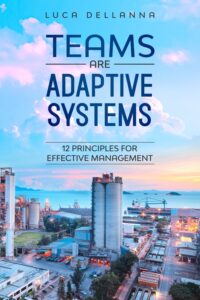Luca's monthly newsletter, on IQ, ethics, solving the right problem, and much more.
Thoughts of the Week is a review of the most interesting thoughts I encountered on Twitter and on other mediums during the last week. It is free, but if you like it, you can support me on Patreon.
1/5: Rationalizing the bottom-up
“What the government controls best is border control / filtering incoming passengers and yet-uncancelled superspreader events (games). They messed that up. The rest is largely ex post response lagging individual behavior.” – Nassim Nicholas Taleb (link)
In his Antifragile, Taleb talks about another example of post-hoc, top-down confabulation of a bottom-up process: university, or as he says, “lecturing birds on how to fly”.
The right way to measure the effectiveness of university is not to compare the average earnings of those who go to college compared to those who do not – as college admission filters for the smarter and the harder working (at least in a measure). Instead, university effectiveness should compare the success of those who graduate from college with the success of those who could have attended college, but decided not to.
Similarly, regarding the pandemic, gauging the damages of government policy on the economy by comparing it to the economy before the outbreak is wrong. Instead, we should compare the economy after government policy with what the economy would have been if the government didn’t take action. Data from OpenTable shows that restaurants were seeing a huge decrease in customers already before the lockdown was enforced – in large part, the lockdown was the formalization of a behavioral change that already took place.
In general, we have this tendency to attribute causality to the top-down, whereas it often just formalizes the bottom-up.
2/5: Change
“The reason why periods like this accelerate change has provable logic. Normally downside risk of trying something new is greater than downside risk in delaying decision or testing. When this equation changes as it has now, then things accelerate.” – David Galbraith (link)
Yes. There is also a second component. In normal times, relative to the baseline, there is an uncertain upside for doing something new and no downside for not doing it. During the pandemic, relative to the baseline, there is a certain downside for not doing something new. Incentives flipped from positive to negative and from uncertain to certain.
Bureaucracies and politicians faced a hardly-seen-before backlash against their lack of change, as people got to closely experience on their skin, at least vicariously, the dangers of stagnation.
A good lesson for behavioral change: to accelerate it, flip the incentives, from positive (only) to negative (too) and, most importantly, from uncertain to certain.
The second edition of “100 Truths You Will Learn Too Late”
One year ago, I published my bestselling book “100 Truths You Will Learn Too Late”.
Yesterday, the second edition hit the bookshelves. You can check it out here: Gumroad and Amazon.
Some reviews:
Absolutely brilliant. You might have grasped some of these concepts before but having them structured and in writing makes all the difference […] I will surely recommend it to friends and co-workers. – Alberto Pisanello
A very thoughtful piece of writing, deep and wiring!” – David Krejca
“Luca Dellanna’s new book “100 Truths” is super tight! […] Practical, directional advice.” – Hari Meyyappan
“100 Truths has been a game changer.” – Adam English
“A thoughtfully written book in very straightforward language.” – A.L. Peevey
3/5: Conspicuosity
“You need cautious rules-of-thumb which are both simple and visible. For rules to work, it helps if it is immediately apparent when someone is breaking them.” – Rory Sutherland (link to the full essay)
In point #2, I mentioned how changing incentives from uncertain to certain is critical for behavioral change. Making it immediately apparent when someone is breaking them is a necessary step.
An additional benefit of doing so is that it makes violations conspicuous, allowing for community policing.
Police officers and bosses have the authority to call out violations; peers such as neighbors and colleagues lack it. For them to call out a breach, it must be so conspicuous that the violator has no alternative than to reply with a “sorry, you’re right”.
When I was living in Germany, car pollution was managed, like in the rest of Europe, by requiring a regular engine gas exhaust check at a certified technician. Unlike (most of) the rest of Europe, Germany requires a big green sticker with the year of validity to be applied to the windshield so that police officers can spot violations from meters of distance. A much better approach than the one used in Italy up to a few years ago, where police officers have no way to check whether a car made its biyearly exhaust check other than stopping the driver and inspecting the car’s papers.
The #1 rule of any policy is to make violations conspicuous.
4/5: Functions
“A thing so self evident that I forget it was once difficult to understand for me: elementary particles don’t have identities, beyond the causal effects they have on other particles. They are like blocks in Minecraft or gliders in Game of Life: they are functions in a software.” – Joscha Bach (link)
The same applies for knowledge stored in our brain. It is not encoded as information in a database. It is encoded as functions in a computer program – our synapses.
In fact, our synapses act like “AND” and “OR” functions in a computer program, determining transformations in inputs and outputs rather than being pieces of information themselves.
(More on this in my 2021 book “The Nature of Learning)
5/5: Risk management
“Risk management and “science” are not the same thing. Risk is about asymmetries. With 0.1% error rate, few flight attendants would be alive.” – Nassim Nicholas Taleb (link)
In science, the burden of proof for a statement is generally constant, such as “a study with a p-value lower than 0.05”.
In risk management, instead, the burden of proof to advocate for or against an action depends on the consequences of action and inaction, respectively. For example, I do not need to prove that masks are effective in using them, as their side effects (compared to a lack of cover) are bound in the proximity of zero, and their upside is yes unknown but also unbounded.
As another example, whether to use a drug should not (only) depend on whether it is reasonable to expect an improvement relative to placebo, but on whether the patient is better off taking the drug (or not taking it) after having taken into account the side-effects of taking it and the risks of his illness if left unaddressed. The worse the illness and the lower the side effects, the lower the burden of proof on the effectiveness of the drug.
Science should be subordinate to risk management – for the rationale for decision making should be survival, not logic or “making sense”.
My own essays of the week
- Questions on Chinese data
- The 2005 decision that made the 2020 pandemic a disaster waiting to happen
- How many people are we really testing
- Data quality matters more than data quantity
As a reminder, you can subscribe to my COVID-19 newsletter for free here.
I also wrote a thread comparing Orwell’s 1984 to the Fed’s actions (link).
As long as the pandemic continues, I will focus most of my time working on it. The “Thoughts of The Week” newsletter might see a temporary decrease in frequency.
…
If you liked this newsletter, please share it with your friends!
They can subscribe here: luca-dellanna.com/newsletter
Otherwise, you can support me on Patreon.
…
You might also like my books
(Here is my general disclaimer.)
The order of the thoughts only represents the order in which I encountered them, and does not imply any sort of prioritization. Quotes are edited for punctuation and grammar. Eventual formatting is mine. Also text outside of italicized quotation marks is mine. The inclusion of quotes does not imply my endorsement; merely, that they gave me food for thought. I did not optimize this review for clarity, but for its ability to spark thoughts in the reader.
12. Thoughts of The Week #60 (19 Apr 2020)







